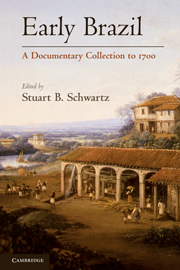Book contents
- Frontmatter
- Contents
- Preface
- A Note on Translation
- A Note on Portuguese Currency, Weights, and Measures
- Maps
- 1 The “Discovery” and First Encounters with Brazil
- 2 The Donatarial System
- 3 Royal Government
- 4 The French Interlude
- 5 Indians, Jesuits, and Colonists
- 6 The World of the Engenhos
- 7 Government and Society in Dutch Brazil
- 8 Burdens of Slavery and Race
- 9 Public and Private Power
- 10 Religion and Society
- 11 Frontiers
- Index
2 - The Donatarial System
Published online by Cambridge University Press: 05 June 2012
- Frontmatter
- Contents
- Preface
- A Note on Translation
- A Note on Portuguese Currency, Weights, and Measures
- Maps
- 1 The “Discovery” and First Encounters with Brazil
- 2 The Donatarial System
- 3 Royal Government
- 4 The French Interlude
- 5 Indians, Jesuits, and Colonists
- 6 The World of the Engenhos
- 7 Government and Society in Dutch Brazil
- 8 Burdens of Slavery and Race
- 9 Public and Private Power
- 10 Religion and Society
- 11 Frontiers
- Index
Summary
During the two decades after the Portuguese first arrived on the Brazilian coast, their presence remained occasional and intermittent, limited in the main to the visits of small ships loading dyewood. The Portuguese Crown made efforts to clear foreign competitors, especially Norman and Breton ships, from the coast, and to that end Martim Afonso de Sousa captained an expedition in 1532 that sought to ensure Portugal's control of the new land. Acting on his advice and that of his cousin, the powerful courtier Dom António de Ataíde, the king Dom João III divided the coast into territorial grants that could be assigned to individuals who would assume the responsibility of protecting, settling, and developing their areas. The coast was divided into fifteen parcels called hereditary captaincies, and these were assigned to twelve Portuguese courtiers and soldiers, mostly members of the lesser nobility. Each man who received an award, or carta de doação, was called a donatario. Each recipient bore the title of captain as well.
The apparent model for these grants was the Portuguese senhorio, or seignory, which awarded rights and privileges in perpetuity but was not based on feudal obligations. The rights of taxation, justice, administration, and the privileges to promote settlement and economic development were conceded and detailed by the king. The donation that delineated the relationship between the donatario and the king was accompanied by a foral that spelled out the obligations of the colonists to the donatary captains. In the Middle Ages, these had been granted by the lord to the people in his domain, but by the time of the settlement of Brazil, the Crown had taken upon itself the granting of these documents, thus reducing the independence of the nobility. The donatarial captaincies were an imaginative adaptation of Portuguese medieval precedents to the challenge of colonization but proved in the long term to be unsatisfactory. Some areas were never settled; others floundered because of neglect, wars with native peoples, and internal dissension. Nevertheless, the captaincies provided the first administrative structure for the settlement of the colony.
A Royal Charter for the Captaincy of Pernambuco, Issued to Duarte Coelho on 24 September 1534
(From História da Colonização Portuguesa do Brasil [Oporto, 1924], vol. III, pp. 312–13).
King John [III] etc. To all those to whom this letter is addressed I wish it to be known that, with all due favor, I have now made a land donation to Duarte Coelho, a nobleman of my household, for him and for all his children, grandchildren, heirs and successors, in perpetuity. This grant will ensure the due interest and inheritance relating to the captaincy and will ensure the government of sixty leagues of my territory along the coast of Brazil. This territory starts in the south at the River São Francisco, at the Cape of Santo Agostinho, and ends [in the north] at the River Santa Cruz, which is in line with that cape. All this is more fully set out in the Charter of Donation that I have issued to him regarding that territory. It is highly important to have a charter stating the rentals, taxes, and other levies which have to be paid, not only those due to me and to the Crown, but also those due to the captain by virtue of his land donation. Being aware of the quality of this territory, I now once more command that it be inhabited, populated, and developed, since it is expedient that this be done in the most suitable manner and as soon as possible. I consider this decree to be in the service of God and in my own interest, as well as that of the captain and inhabitants of the territory. As I am pleased to grant them this favor, I have deemed it appropriate to order that this charter be drawn up in the following form and manner.
- Type
- Chapter
- Information
- Early BrazilA Documentary Collection to 1700, pp. 13 - 36Publisher: Cambridge University PressPrint publication year: 2009



